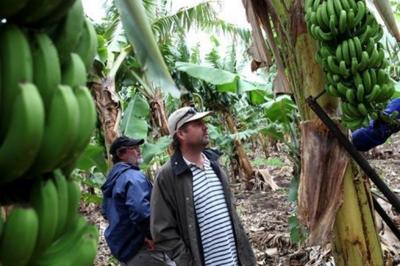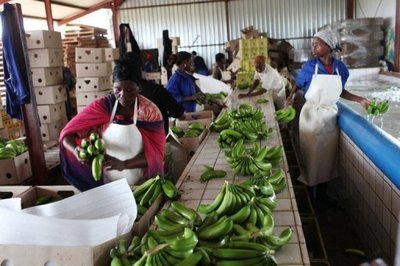
Agence France Presse | 11 January 2011
By Johannes Myburgh
MAFAVUKA, Mozambique — Thousands of white South African farmers are leaving their homeland to work abroad due to post-apartheid land reforms, a shortage of affordable territory and severe water shortages.
Lance Spear is among those in neighbouring Mozambique who are renting land at a fraction of the cost paid back home and where he can also pay lower wages to workers and make better profits.
"The big incentive is the availability of land and water," the 39-year-old says, as he strolls across the dark brown, rain-soaked soil of his 200-acre (81-hectare) banana plantation in Mozambique.
"South Africa doesn't have any land or water. It's all gone," he adds, watching 20 workers pack freshly-picked bananas into boxes headed across the border to South Africa or to markets in the local capital Maputo.
Although South Africa will soon join the BRIC (Brazil, Russia, India and China) group of global emerging nations, talk of the country being a regional economic powerhouse rings hollow to Spear.
Five years ago, the third-generation planter joined a growing group of white South African farmers who have left the rainbow nation.
Around 1,500 South Africans have established farms in 23 African countries as far as Egypt and Sudan, most going to Mozambique, in the past decade, according to Agri South Africa (AgriSA), the national trade association.
In the same timeframe, around 4,000 others have started afresh in Canada, Australia, South America and the Middle East, farming-hungry countries keen to attract expert producers with tax reductions, subsidies and free imports.
They have felt forced to move because after apartheid ended in 1994, the government launched a project to return 30 percent of the country's 104 million acres to the black majority. At the time blacks, who form more than 80 percent of the population, lived on only seven percent of its land.
Due for completion in 2014, the government project is lagging far behind target, however, with only five percent of territory redistributed by the end of last year, a worrying trend that has made farmers nervous to invest.
Some countries have already benefited from South African expertise. In only four years food-scarce Zambia has become a net food exporter after a group of 34 South African and Zimbabwean farmers turned around its agricultural output.
Only 10 percent of Mozambique's arable land is being farmed, though it has four times more high potential agricultural territory than South Africa.
At a recent conference in the central Mozambican city of Xai-Xai to attract South African farmers, Dikgang Moopeloa, the rainbow nation's ambassador to Mozambique said regional development would be boosted by the migration.
Profitability, however, is the main reason for the exodus, according to Theo de Jager, vice president of AgriSA.
"A farmer in Mozambique will make more money because he has to spend less," says De Jager, alluding to high input costs in South Africa that have driven out all but the largest operators.
"There isn't space to expand," he adds. "The policy to redistribute a quarter of the land aggravates this."
Dairy farmer Tobias Fourie, 36, attended the conference to scout for opportunities to expand the family business, backing up what De Jager says is a trend of South Africans looking abroad to expand.
"Would you invest in land if you know they're going to take it?" Fourie asked, alluding to Pretoria's land reforms.
"I am a positive South African. Only the unfinished land claims make me negative."
Widely-publicised farm murders have also contributed to the anxiety of whites, with at least 1,200 farmers killed during violent robberies over the past 20 years.
Yet farmers moving elsewhere on the continent do not leave simply because of political issues, says De Jager.
"If they are negative in South Africa they will not farm in (the rest of) Africa, because the situation there is worse," he adds.














